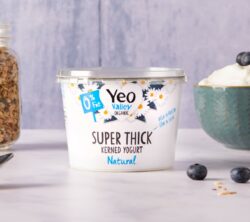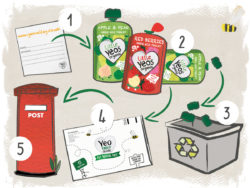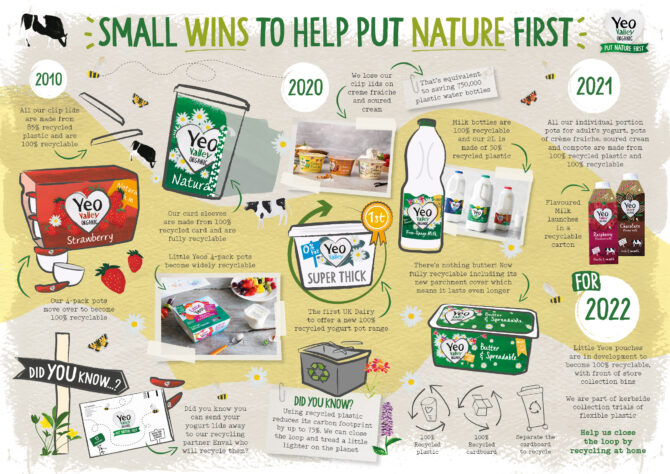Thursday 17th March 2022
I want to start this article by affirming: it’s not you.
Trying to work out what can go in the recycling bin, what needs to go to landfill (gulp), and what in the world to do with compostable/biodegradable packaging is a rubbish dilemma we all face daily.
And, I know, more than most. I spent a long time trying to resolve it as my journalism career took me on crack-of-dawn rides with bin men across London and to the heart of recycling facilities.
I was operating on the assumption it was a dilemma that could be solved – all we needed was the right information and we could create a one-stop guide of what goes in what bin. Simple!
I failed spectacularly to do this.
But I’m not the only one. We’re all failing spectacularly to deal with our rubbish.
Total waste from households increased to 22.6 million tonnes in 2020 from 22.1 million tonnes in 2019, according to the latest government statistics. Alongside this, the total amount of recycled waste from households decreased. (Don’t be too downhearted – the good news is, it was only by 1.2%). [1]
But, the problem wasn’t me. And I repeat, it’s not you. It’s the system.
The question isn’t just about what we as consumers need to do with our rubbish and recycling. It’s bigger than that. It’s about how we restructure the waste and recycling system.
That’s exactly what Joe Bower, Yeo Valley’s Packaging Procurement Manager, spends his days working on. So, we wanted to find out more and ask if he could provide us with some clarification…

Hi Joe. Nice to meet you. First up, can you tell us a little about you…
“Hello, sure. I’m one of the packaging geeks at Yeo Valley and I love it! Sustainability is close to my heart, so I’m proud to be working for a company that recognises the severity of the environmental crisis and the challenges we’re facing, but also actively invests in genuine sustainable solutions to tackle them.
“I’ve learnt so much in my role. Like most people, at the start of my career, I had no idea what the different kinds of plastic were or the various properties they had. I was operating under the false assumption that rigid plastic was recyclable and flexible plastic wasn’t. But, it’s so much more complex than that. So, as it turns out, I had unknowingly been putting non-recyclable plastic into the recycling bin for ages.”
Hopefully you can help ensure we don’t make the same mistakes. To set the scene, is plastic intrinsically bad?
“There’s quite a few sides to that question!
“In terms of carbon footprint, plastic is actually one of the most sustainable food packaging materials, because it’s so light and it has really good recyclability. It also keeps products fresh for longer and gets products to peoples’ homes intact, which is really important when it comes to reducing food waste.
“The issue we have with plastic is that too much of it is escaping into the environment which is unacceptable. But, that’s a problem with the waste stream rather than the material itself.
“We need to reduce the amount of plastic we use. We need to recycle plastic properly. But, in terms of eliminating plastic entirely, I’d say that’s not always the right choice.”
So, at Yeo Valley Organic you’re sticking with plastic yogurt pots?

“Yes. Our customers ask: “Why don’t you switch to glass?” or “Why aren’t you using aluminium?” and they’re valid questions considering the headlines in the media and the misinformation online.
“It would be an easy marketing win to switch to glass. But, that decision would be made on sentiment rather than robust data and analysis. And it would end up doing more harm than good.
“For example glass milk bottles, in comparison, generate a much higher carbon footprint because a lot of energy heat is required to blow glass. The same can be said for recycling glass, too. Plus, glass is heavy and glass milk bottles don’t nest inside each other has to be shipped in it’s blown form so shipping around glass milk bottles is less carbon-efficient. Glass bottles have the benefit of being reusable and they tend to last about 18 uses on average [2], which spreads the carbon footprint.
“However, plastic has a dramatically lower carbon footprint than glass and aluminium – as long as it’s treated properly at the end of life. Recycled plastic has a lower carbon footprint still. That’s why we’re sticking to plastic pots.
“After a year-and-a-half of trials, we’ve managed to implement 100% recycled plastic for the majority of our range. We also wrap our yogurt pots with 100% recycled card. Plus, they have very clear recycling instructions.
“But, no matter how good the material is, we are firm believers that less packaging is always better. Our default motto is “Remove, Reduce, Reuse, Recycle”. Reduce where you can by removing all unnecessary packaging. If you can’t remove it, then look to reuse it. And if you can’t reuse it, recycle it. If you can’t remove it, then look to reduce it. If you can’t reduce it, look to make it reusable. And if you can’t reuse it, make it recyclable and add in recycled content.

“At Yeo Valley Organic we’re strict in assessing what parts of our packaging are unnecessary. For example, we’re going to trial taking the lids off yogurt pots. If successful, that will remove 40 million lids and 120 tonnes of material, reducing CO2e by 742 tonnes – which is huge.
“But, we have to be cautious, because we don’t want to negatively impact food waste (remember that’s the majority of a product’s carbon footprint). It’s important that we take this holistic view when assessing our packaging’s sustainability.”
Who knew so much thought went into a yogurt pot! That’s a really powerful insight into how complex the problem is… are customers generally understanding of decisions you make?
“Our customers trust us to do the right thing. We try to regularly consult with them and keep open communication. We’re transparent about our decisions, but we can’t solve the waste and recycling issue alone – it requires everyone in the food industry, the Government and local authorities to work together.”
So that we can still be part of the solution in the meantime, can you give us any recycling tips?
One tip I would give is to look for the OPRL labels when trying to determine if something is recyclable. It’s a scheme that aims to deliver a simple, consistent and UK-wide recycling message for packaging – whatever the sector.
Another key tip would be to wash and dry your recycling. Food waste is a massive contaminant and therefore a big recycling issue. So if you’ve got a yogurt pot, rinse it out for two seconds before you put it in the recycling bin, and that will really help.
Interview and article by Lizzie Rivera and Francesca Carpani from ethical lifestyle hub Live Frankly.
Have a read of the different ways we’re reducing the impact of our packaging:

References:
[1] https://www.gov.uk/government/publications/progress-report-on-recycling-and-recovery-targets-for-england-2020/progress-report-on-recycling-and-recovery-targets-for-england-2020
[2] https://www.bbc.co.uk/news/business-43724314





OK LOOKED ALL OVER YOUR SITE AND SIGNED UP BUT WHERES THE CONNECTION TO GET YOUR REUSABLE LID THEN………ADVERTISED ALL OVER THE LIDS BUT NOTHING OBVIOUS ON THE SITE!!!!!! thats not playing fare in my books …….
Very interesting. Yeo have had the removable labels for a while which is great. It is so frustrating that other companies have been stuck on “not yet recycled” or now the plastic we can return to larger supermarkets – presumably to get around doing nothing?(eg Walkers crisps, when Two Farmers have managed to create recyclable packets).
We also wash our recycling at the end of washing up so not to waste water etc as well. I agree with the glass issue making it so much less sustainable. It is interesting that on an industrial scale (I’m guessing) bottles only last on average 18 uses. We have the luxury of a milk machine nearby, we having been using that for nearly 6 years. We have broken 1 bottle, and we have just worked out the remaining have been used 240 times each!
Keep up the good work 👍
One thing Governments could do is limit the range of materials that can be used in packaging. Reduce choice of packaging, reduce confusion when it comes to recycling.
A really interesting and thoughtful article. It highlights the dangers of the pitfalls of the simplified answers that are so well publicised when the best environmental options always seem to be more nuanced. It would be great if you could get this article more widely published.
Composting seems the way forward to me, what with the recycling process being so badly fragmented.
I would also like to see what effect the inks have too, as these have never been highlighted in any discussions either, as the interview above demonstrates.
Congratulations Yeo Valley for the great changes you’re making to help us all cut down those carbon emissions and save our natural world from more polluting plastic! I believe our council does its sorting correctly, but I haven’t seen it with my own eyes, so we’re still very dependent on those sorting plants to do their job properly and also on the companies that then deal with the sorted plastics: do they sell it to a reputable company? or do they sell it to a scam company which dumps it on a poor developing country for a cheap price? What a minefield! We’ve got to just do the best we can within our limitations, but thanks for all the helpful information, Yeo!
I always wash my recycling before putting it in the bin but there are still a lot of things the council don’t take. I don’t use Little Yeos but would use the boxes to post them back if I did. However, with regard to soft plastics like the Yeos pouches, outer bags, crisp packets, pet food pouches etc, Morrisons the supermarket take them. I just gather them all in a bag and drop them off with my shopping, washed, if course.
You’ve muddled up your its and it’s.
So here’s your picture caption: “Our Super Thick yogurt pot is the first of it’s (No! Must be ITS – the possessive form) kind – it’s (Yes! IT’S is an abbreviation of “it is”) made from 100% recycled plastic!” Not pedantry – you can see there’s a useful difference. Just ask yourself, would you say “Our Super Thick yogurt pot is the first of it is kind”? Noooo…
I agree this article was definitely informative. I will send for a bag for the lids but what you didn’t say was what kind of plastic those were made of and how those are recycled differently. Have you considered foil peel off lids? I’d also be happy to purchase a reusable lid to use all the time. I’ll need to wait till they come back into stock first but I will order a couple. I agree with what people are saying about our local authorities too and how some people just don’t care about the long term plan we are trying to achieve. I always clean my recycling ♻️ till they are spotless aswell. However, much as my folks are trying their best, they are elderly and can’t see so well now, they struggle to rinse things properly, its not a case of not caring. We all have to do our bit for the planet. At the very start of separating our rubbish, long ago, I was christened “a recycling freak”! It’s stuck, so be it! I don’t have to empty my domestic bin that often these days. Keep up the good work Yeo. Thank you.
I completely agree with an earlier comment – I would be happy to pay for a robust, reusable lid for large pots. I really appreciate how much care has gone into reducing waste and making recycling easier.